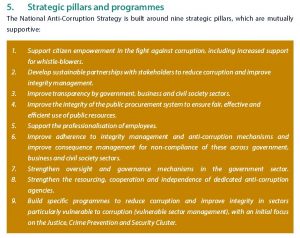|
Getting your Trinity Audio player ready...
|
The South African government planned to release its draft national anti-corruption strategy (NACS) on International Anti-Corruption Day, 9 December, last year. The document was delayed until 14 May, when it was launched to a lukewarm response from the nation.
Last year Corruption Watch was engaged in the process that prepared the draft, along with other pertinent civil society organisations. We welcome the initiative, but we know that it will not succeed unless all sectors of business, government and society buy into it.
“Please actively contribute your thoughts, opinions and voices to ensure that together we can stop corruption,” said Minister in the Presidency Jeff Radebe – also the chairperson of the Anti-Corruption Inter-Ministerial Committee – at the launch. “The responsibility to fight the scourge of corruption does not lie in government only. We need everyone to …. fight this problem.”
And indeed, we suggested to government that civil society help to drive the nation-wide discussion and participation, because if it comes from government alone there is a chance that it may not be taken seriously. Our suggestion was not taken to heart, as government has decided that it alone will drive the NACS.
However, the document is now out there and we take a look at what it’s all about.
The situation now
The document reflects the inclusion of some of the comments and recommendations made during initial consultations in September and October 2016, and is divided into two parts. The first part outlines the process to date and details a roadmap that will ensure that the process for developing the final strategy is inclusive and transparent, and developed with substantial contributions from leaders in government, business and civil society. The second part contains elements such as a vision, objectives, strategic pillars and programmes for the strategy.
The NACS document acknowledges that corruption is a problem that is not going away. “Assessments of public perceptions over the last 15 years show that citizens feel that corruption has increased. Although a rough indicator of corruption in the country, these perceptions are important pointers in terms of the level of trust between the State and citizens,” it notes.
“In policing, corruption more generally, i.e. not just bribery but also theft, fraud and other forms of corruption, has been described as systemic, limiting the State’s ability to tackle it and other forms of crime.”
But the public has a role to play in helping to clamp down on corruption, the document explains, as improved adherence to certain laws would reduce the room for corruption. For example, greater compliance with traffic laws by the public potentially provides fewer opportunities for traffic officers to solicit bribes. Conversely, ensuring that the rules of the road are appropriately enforced by traffic officers could increase compliance by road users and reduce the incentives to offer bribes.
Compliance and enforcement are weak
Instruments such as the Public Service Anti-Corruption Strategy, the Batho Pele programme, legislation such as the Prevention and Combating of Corrupt Activities Act (Precca), other legislation dealing with financial and organised crime, public finance management and procurement legislation, and legislation promoting the public’s access to information held by the public and private sectors, have all been part of the national strategy to reduce corruption and promote ethical behaviour.
“Despite many public servants and politicians being committed to serving the public, compliance with these regulations and codes has been generally weak,” the document states. “This is especially the case in supply chain, human resource management and in compliance with frameworks for disclosing business and other financial interests. An environment of non-compliance enables corruption and makes it hard to detect.”
In the private sector, large businesses follow the King Code which, too, has been inadequately enforced through domestic legislation, though legislation such as the Companies Act now incorporates some of the aspects covered in the code. This has to some degree assisted in improving the transparency of private sector activity. But despite Precca obligations to report corruption and various other offences, many companies still fail to report corrupt activity as a result of the stigma attached to admitting control and governance failures. Also, unlisted and smaller companies often fall under the radar.
A central issue of concern raised by civil society organisations and the National Development Plan is that the independence of the criminal justice agencies, such as the Directorate for Priority Crime Investigation or Hawks, tasked with investigating and prosecuting corruption has not been effectively maintained.
Recommendations
The NACS presents its vision for South Africa as:
- An ethical and accountable state, business and civil society sectors in which those in positions of power and authority act with integrity.
- Citizens who respect the rule of law and are empowered to hold those in power to account.
- Zero tolerance of corruption in any sphere of activity and substantially reduced levels of corruption.

The National Anti-Corruption Strategy’s nine pillars.
The document outlines a set of strategic pillars around which government, business and civil society can plan and align their efforts. It also serves as a tool or citizens and others to monitor the progress of the strategy.
Each pillar is discussed individually, with steps to be taken as well as the rationale for those steps. For instance, for pillar 1 – Support citizen empowerment in the fight against corruption (including improved whistle-blower protection) – explains that through paying a bribe to a government official, members of the public can perpetuate corrupt activity, while joining public campaigns or blowing the whistle on suspected cases of corruption, the public, civil society and media play a role in anti-corruption work, and can provide pressure for improved accountability in various sectors.
One of the measures outlined for this pillar is the development and implementation of awareness-raising campaigns on the nature and effects of corruption, and the mechanisms available to reduce corruption, including corruption-reporting hotlines, in partnership with civil society. The rationale is that improved awareness of the impact of corruption in particular services or sectors can play a role in influencing positive behaviour change away from corruption, and encourage people to report instances of corruption, if campaigns have a clear thematic focus that allow people to identify in quite specific ways with the issues being raised.
The discussion document does not include comments and constructive recommendations for the reorganisation and reduction of some of the proposed pillars and strengthening of possible programmes that were made during the initial sectoral consultations with select government, business and civil society stakeholders in September and October 2016. However, these comments will be put forward during the public discussion phase.








